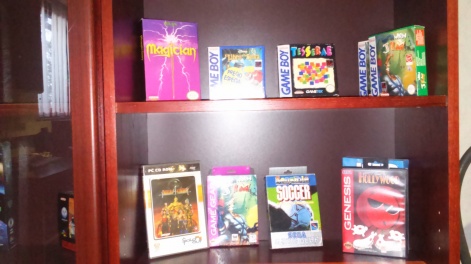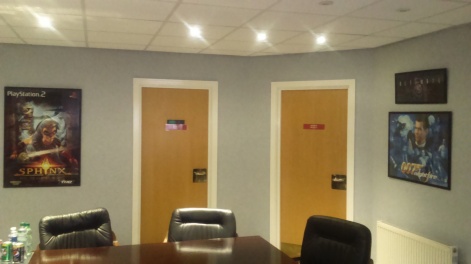While Eight Pixels Square is every inch a modern mobile games company, to visit the studio is to be overwhelmed by history.
The company was established in 2013, but founded and largely staffed by those who have been in the industry for much longer.
Set up by Hugh Binns, Mat Sneap, Tim Rogers, and Ian Sneap - all of whom were also founding members of the now-defunct Eurocom back in 1988 - this is a team with experience in droves.
Learning from history
When we meet Eight Pixels Square co-owner Hugh Binns at the studio - still based in Derby at Eurocom House, the same town in which Eurocom opened its doors and the same building in which it met its end in 2012 - the company's former life as a prolific console developer is documented through posters and stacked cabinets of games.
Binns recalls that Eurocom developed “about 70 or 80 games” between 1988 and 2012, often working with existing IP such as James Bond and Dead Space.
Now working on free-to-play mobile games, and mostly developing its own IP, Eight Pixels Square has been careful to choose genres and styles that play to its existing skills.

“A lot of our team is experienced in console and home computer development - as part of Eurocom, or Rare, or Core - so there are a lot of old-school skills that are still really applicable now,” Binns explains.
Every genre is under-served until someone comes along and dominates it.Hugh Binns
It's perhaps unsurprising, given the Eurocom back-catalogue, that it was the shooter genre that Binns and his team felt most capable of dominating on mobile.
“There's been a pattern on the app stores that almost every genre is under-served until someone comes along, cracks it and dominates it,” says Binns.
“You look at the strategy or puzzle genres before Supercell and King, and they just expanded the market for those genres enormously, simply by executing very well. So there's great opportunity to do the same in the action/shooter genre.”
Shooting for greatness
With this in mind, and buoyed by the success of games like Tencent's WeFire in Asia, Eight Pixels Square set out to pursue the “real opportunity” that is the shooting genre on mobile.
For its first post-Eurocom project, the team found itself in the familiar position of developing for an external publisher.
“The first game we developed was a game called Lawless with DeNA, and we knew we could draw on experience from the likes of Bond and Dead Space,” Binns tells us.
However, while this was crucial for developing a style, he notes that working with publishers is not something interested in pursuing for every one of its projects - although, in some cases, it would be useful.
“We're looking, at least with some of our games, to work with big brands and IP that is very recognisable,” he says.
“That will give us some very interesting creative opportunities, and for some of those we'll be partnering with other companies to do that.”
However, Binns goes on to say that Eight Pixels Square “enjoys the freedom of creating its own IP,” and as such that will remain the studio's primary focus.
Going it alone
Indeed, Binns speaks with the most pride when he discusses the studio's self-published efforts: All Guns Blazing (November 2014) and Cartel Kings (June 2015).
“[All Guns Blazing] features Time Crisis-esque, third-person shooting core gameplay with a builder metagame and PvP,” explains Binns.
This hybridisation, almost sneaking in core shooting gameplay under the guise and style of familiar and non-intimidating mobile strategy, has become a core tenet of the studio's approach.

“It's about working with proven mechanics and design that we know people will like - the social side of the games, having PvP, and so on - and combining that with something that's very accessible,” Binns considers.
The formula seems to be working, too: “that got a really good reception from the community, as well as from Apple and Google - we got an Editors' Choice in the US and several countries.”
“Cartel Kings was a further evolution of that, targeted particularly at some of the Asian markets where All Guns Blazing didn't work so well simply due to its style.”
Long-term retention is the way to give us a very healthy business.Hugh Binns
Binns notes that targeting Asia has proven a good strategy, validating Eight Pixels Square's belief in the Asian appetite for mobile shooters: “[Cartel Kings] has been particularly successful in China, Korea and Japan.”
From products to services
But while pure, traditional game design smarts certainly have a place in the world of modern free-to-play development, Binns tells us that there are a number of areas in which the studio has had to adapt.
Focusing more on KPIs, particularly long-term retention, is Binns' plan for future projects: “I think [retention] is the way to give us a very healthy business, and to build a community... we really admire the companies like Supercell and how they've focused on that.”
Some transitions have come easier than others, with Binns noting that the team has particularly enjoyed the streamlining of team sizes afforded by designing for mobile.
“Having come from console teams of up to 100 people, it's great to work with teams that, at the start, may only consist of two or three people and peak at around 20-25. It gives everyone a chance to contribute,” he says.
However, while Binns explains that the studio is “not looking at a steep rate of expansion,” having only grown from 30 to 44 employees in three years, transitioning from console to F2P would have been impossible without a few crucial hires.
“A lot of new skills have had to come in, particularly in areas such as analytics, the performance marketing and user acquisition side, community and live ops, all of the backend server infrastructure,” he tells us.
“[As a F2P dev], the hard work really starts when the game is live, and you're constantly looking to learn from your users... that might come from metric data, user reviews, community feedback, or press - we do a lot of in-person user tests, too.”
The money gives us the time to have long soft-launches to polish the experience, but most importantly the expertise to take opportunities.Hugh Binns
“With All Guns Blazing and Cartel Kings, we run events every week and have got new content coming out all the time... it's a very different proposition.”
Strategic guidance
Eight Pixels Square is not facing the merciless world of free-to-play completely alone, though, following a successful funding round in November 2015 that included support from UK super angel Chris Lee.
Lee previously co-founded both Media Molecule and FreeStyleGames, and is now an investor and advisor to several UK F2P studios, including Hutch and Space Ape.
“The funding was important in itself but the biggest positive for the business is that it means we've got Chris Lee as an advisor on our board, so that really helps us from the strategic side of things,” enthuses Binns.
“The money gives us the time to have nice, long soft launches on games to polish the experience, but it also means that we've Chris' expertise to make the most of our opportunities.”
With varied F2P titles yet to be announced - but very much in the works - due to see either soft launch or full release in 2016, Eight Pixels Square is looking more confident than ever in the way it approaches mobile development.
Boosted by strategic and financial support, not to mention the lessons learnt from its previous releases, it will certainly be interesting to see the culmination of these factors as the year progresses.




















